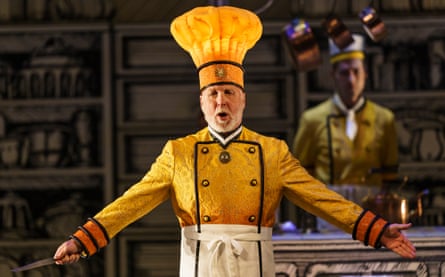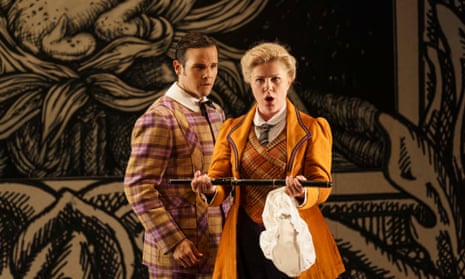Nobody ever came out of a performance of Mozart’s The Magic Flute thinking it made perfect sense. Glyndebourne’s irreverent, entertaining, sometimes magical new production, the UK debut from the design and direction team of Barbe & Doucet, follows its own fairytale logic. Their take on the opera is set inside a 1900s Viennese hotel, and, more specifically, inside the head of a sleepwalking guest, Tamino. In the overture, he nearly bumps into a maid as he drifts through the corridor. In his dream, he is attacked by a serpent made from the giant stack of plates she was carrying – and so it continues. Imagine you have checked in to a hotel room, turned on the TV, watched Downton Abbey, Masterchef and a BBC4 documentary about the suffragettes, then switched channels for Scrapheap Challenge and nodded off during the Go Compare ad. This is the dream you would have.
That’s a long evening’s viewing, and this is a long opera. Most directors make at least a few cuts, but not Barbe & Doucet, who have said they always turned down previous requests to stage this opera because of Emanuel Schikaneder’s libretto, with its acceptable-in-the-1790s references to the duplicity of women and the weirdness of a man with a black face. Cutting the text would be a cop-out, they argue; instead, they present it complete, in the original German, and make it work for them. It’s a credit to the cast, especially Björn Bürger’s engaging, omelette-cooking Papageno, that only a couple of passages register as longueurs. Monostatos’s face is black because he works in the boiler room and is smeared with coaldust. And as for the tiresome women – well, this is the age of the suffrage movement, and the attitudes expressed early on by Sarastro and his henchmen just reflect their pre-Enlightenment state. Sofia Fomina’s beautifully sung Pamina can fix that.

Visually, it’s a theatrical feast of eccentricity. Every room, from the conservatory to the wine cellar to the all-important kitchen, is created from André Barbe’s pen-and-ink flats. Things light up magically; the dumb waiter “speaks”; a pile of vegetables stands up, stretches and becomes the vegetable man in the famous Arcimboldo painting. The Armed Men are giant puppets made from bits of the hotel heating system, and we know the Queen of the Night is coming because of the whirr and clank of ancient machinery – nothing good ever came out of an onstage lift.
Yet Caroline Wettergreen’s elegant Queen, with even more stratospheric high notes than normal, is ambiguous, even sympathetic. By contrast, though he may sound gloriously deep and velvety, Brindley Sherratt’s Sarastro and his band of self-important chefs are ridiculous from the start (and having one of the chorus feign dwarfism feels wrong). Perhaps their Tenniel-esque costumes represent the first tiny puncture in the balloon of Mozart and Schikaneder’s serious intentions; by the end, that balloon is zooming and flapping all around us, as Papagena pushes out baby after baby and Tamino, winningly sung by David Portillo, wins his stripes just by doing the washing-up.

The ending is serious but feels lightweight. In the pit, the Orchestra of the Age of Enlightenment bring period-instrument texture and shapeliness to the score, but it can feel as if conductor Ryan Wigglesworth is looking up at a different production, one that’s solid and conventional, not the witty, irrepressible, unforgettable one on stage.
At Glyndebourne, Lewes, until 24 August.

Comments (…)
Sign in or create your Guardian account to join the discussion